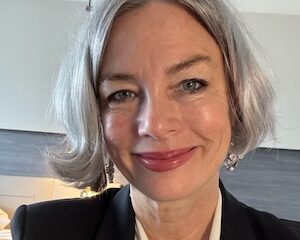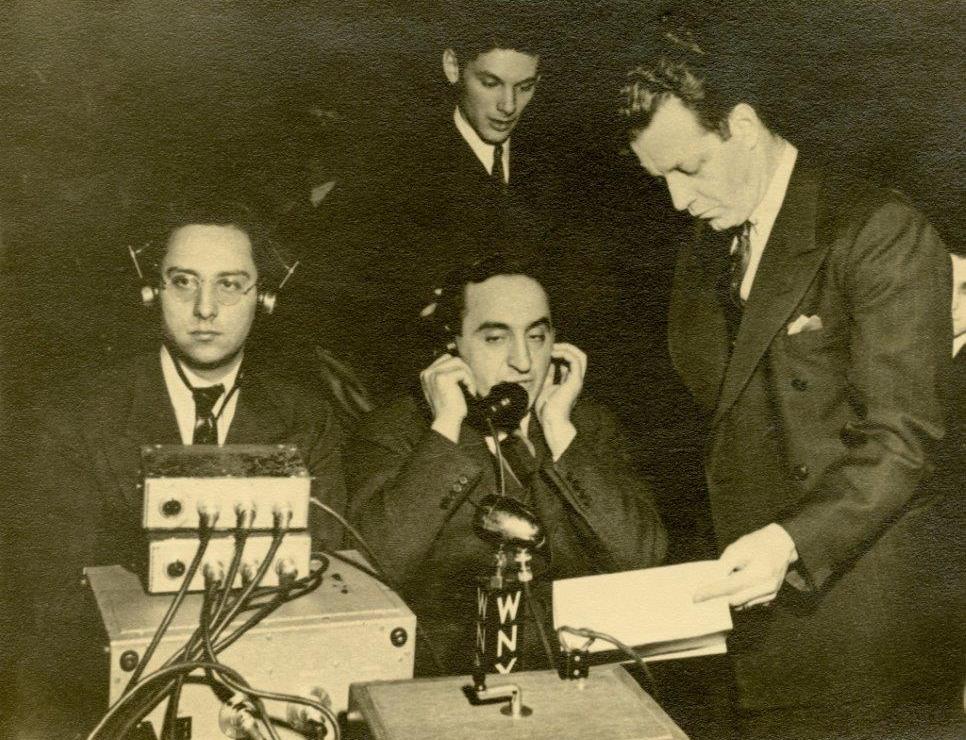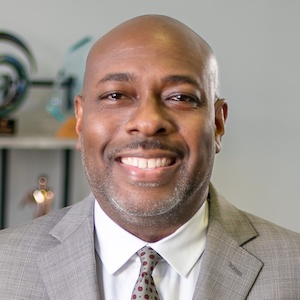Shining bright: 22 Rising Stars whose ideas and skills are redefining public media
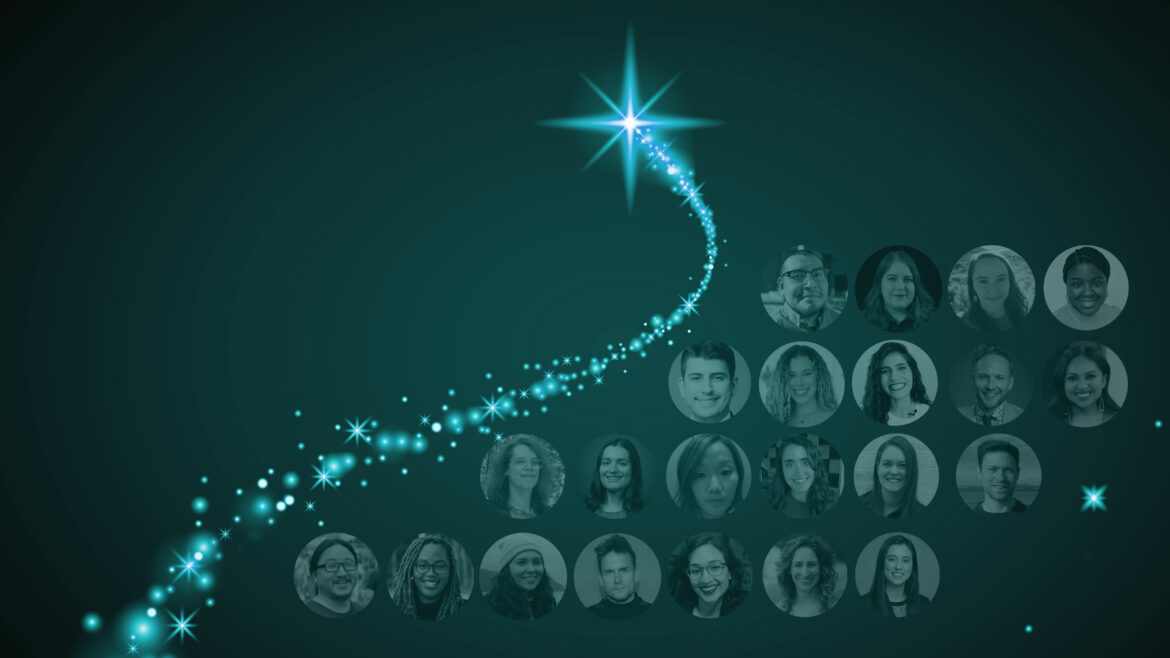
Chris Campbell
Current’s new initiative to shine a spotlight on public media’s up-and-coming talents drew an amazing response. We asked for nominations of Rising Stars — early- to mid-career professionals who are making a difference for public media organizations and audiences. So many of the 238 nominations offered compelling testimonies of talented colleagues who are introducing new ideas, voices and skills to change the ways audiences experience and engage with public media.
These 22 young professionals rose to the top of our evaluation process to be recognized as a Current Rising Star of 2023. Their profiles draw from the nominations submitted by colleagues and each honoree’s responses to a survey about their accomplishments, values and sources of inspiration.
This is Current’s inaugural class of public media Rising Stars — congratulations for your work and achievements. Keep shining bright! — Karen Everhart
Mayowa Aina
Special project reporter/producer
Pacific Public Media/KNKX, Seattle/Tacoma, Wash.
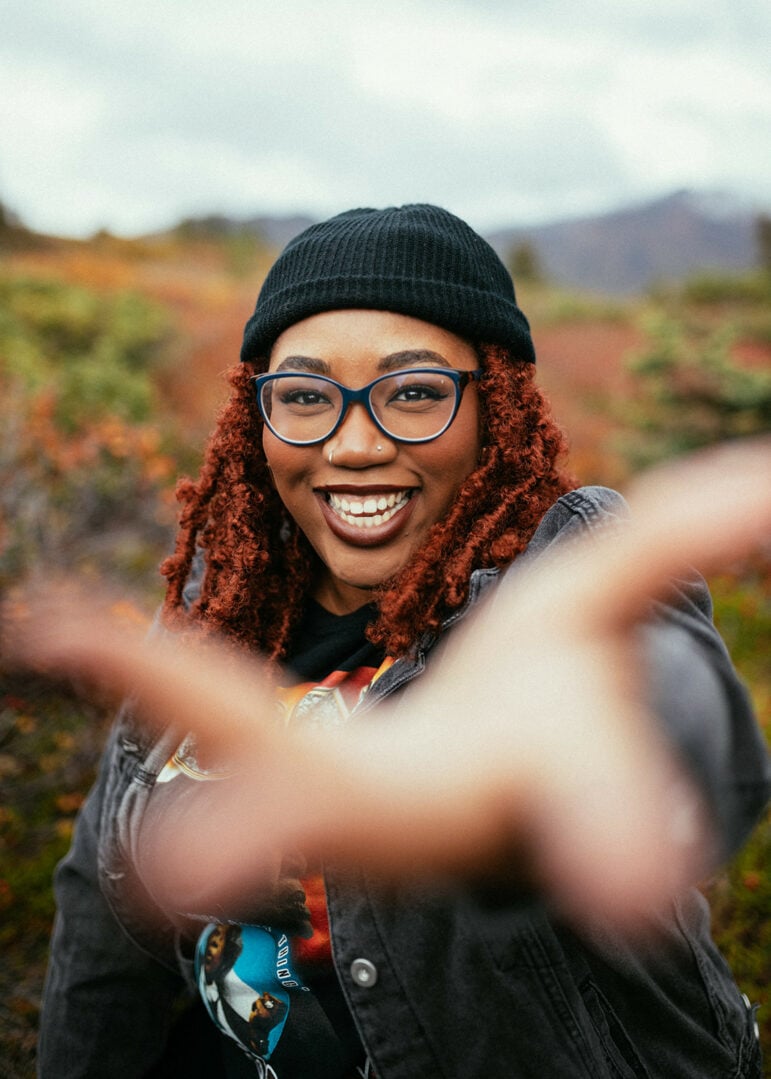
In three words: “Empathy, intelligence, creativity”
What colleagues say: Mayowa is a utility player in every way, in both talent and willingness to pitch in where needed. She can do quite literally anything — podcasting, hosting, daily spot news and features of all varieties. On top of that, she has an eternally positive attitude and an incredibly humble disposition.
What Mayowa says
Proudest moment: The podcast I made with my colleagues last year, The Walk Home. It’s about the police killing of Manny Ellis in 2020. It was one of the most ambitious and difficult reporting projects that I’ve worked on to date, professionally and personally. I’m really proud to have done this work in the city I grew up in. And I’m grateful to have had the support and confidence of our entire newsroom and organization. This project has influenced every aspect of my career since.
How her values align with a career in public media: It’s important for me to feel connected to and rooted in my community. And it’s important that those connections are authentic. Because we are listener-supported, and we are in people’s ears every day, people feel connected to us. That makes me feel like I’m a part of something bigger than myself — but not so big that I’m out of touch.
I think public media is the best and most efficient way to be an informed citizen. Working in this industry helps me feel connected to my community and be an active participant in it. Public media is a vital and exceptional service that is free and widely available.
While public media continues to work toward its diversity and equity goals in all facets (including pay equity), I believe this an industry anyone can join and be considered valuable.
Inspired by: Colleagues whose commitment and imagination know no bounds. And my peers in the audio industry who believe that storytelling can change the world, and whose projects demonstrate that.
I’m inspired by the students in my community who ask me important and difficult questions about what’s happening in the world, and by my younger self who never thought I could make a living just by being curious. And I am inspired by those moments when I get to brainstorm with a team of creative writers and thinkers.
Advice for other young professionals in public media: Have hobbies! Go out and live in the world, nurture your relationships, experience things and do things just for you. Have an identity outside of being a journalist. That’s what makes you stand out and what will sustain you when times get tough.
Professionally, say “yes” to different opportunities as you have capacity because your network is your net worth. As cliche as that may sound, it’s true! Meet and work with other people in the industry. Try to specialize, there’s value in knowing how to do one or two things really well or covering a specific beat for an extended period of time.
Lead with compassion, kindness and honesty. You are an artist — own your point of view, trust your instincts and feel confident in your unique voice. Remember, the writing is just as important as the tape.
Ask for help. It’s literally our job to ask people questions, and that applies to us as individuals. Whether it’s for personal or professional advice, ask!
If you can’t think of a story that’s never been told, try to tell it in a way that’s never been done.
Oh, and have fun!
Kassidy Arena
Engagement producer
KBIA, Columbia, Mo.
In three words: “Thoughtful, dynamic, empathetic”
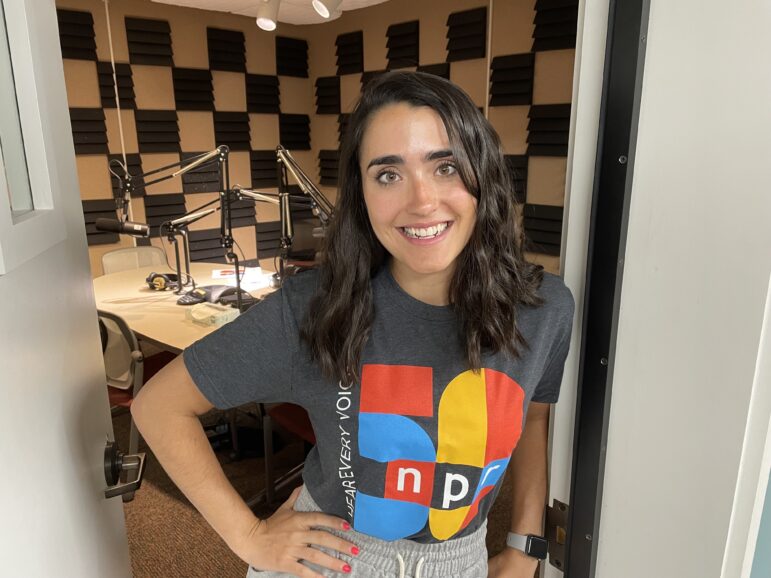
What colleagues say: As the engagement producer at KBIA, Kassidy is proactively reaching out to parts of our community that we have not served well in the past. In many cases, this means building relationships with community members whose previous experiences with journalists led them to not trust us. For example, after she was initially rebuffed by a community member who she approached for a story involving Native peoples in our region, she listened to the person’s concerns and followed up with multiple conversations over a few weeks to build a dialogue with the source.
Kassidy is purposefully transparent about the reporting process, and fact-checking and verification are part of it. To me, this media literacy work is exactly what journalists need to be doing if we are to engage and serve our public. Kassidy is very well-suited to it.
What Kassidy says
Proudest moment: When sources, especially those who have been underrepresented or misrepresented by the media, share their reactions to my reporting. These have included Spanish-speaking immigrants, an 11-year-old transgender child and an elder from a Native Nation. When I have the opportunity to help make them feel heard and valued, that makes me the most proud.
How her values align with a career in public media: I truly see my career as a public service. In my life, I strive to help my communities understand the world around them and to help others understand my communities’ perspectives. I have always valued education and the right to an education no matter where you come from or who you are.
Inspired by: I went to the University of Missouri’s journalism school with the intention of being a TV reporter. As someone who is hard of hearing, I thought radio would be out of my reach. Then Bram Sable-Smith, my instructor for a beginner multimedia course, showed me how radio is a visual medium and that I could excel in a field reliant on audio even with a hearing aid. I also had the opportunity in college to work with and learn from other amazing reporters and leaders.
After graduation, I got a job with Iowa Public Radio through Report for America. It was there that I came across another inspiring figure. Iowa Public Radio News Director Michael Leland taught me that the events and situations that affect my Latino communities are important for everyone to know and value.
Advice for other young professionals in public media: Find what makes you excited and focus your energies on that. If talking to new people makes you excited, do it! If digging through documents gives your butterflies, investigate it! If producing that perfect fade of audio makes you smile, focus on that. There are so many roles within public media. You can find your niche and contribute without burning yourself out on the things that don’t bring you joy.
Katie Blackley
Digital editor/producer, internship coordinator and host of the Good Question! Podcast
WESA, Pittsburgh
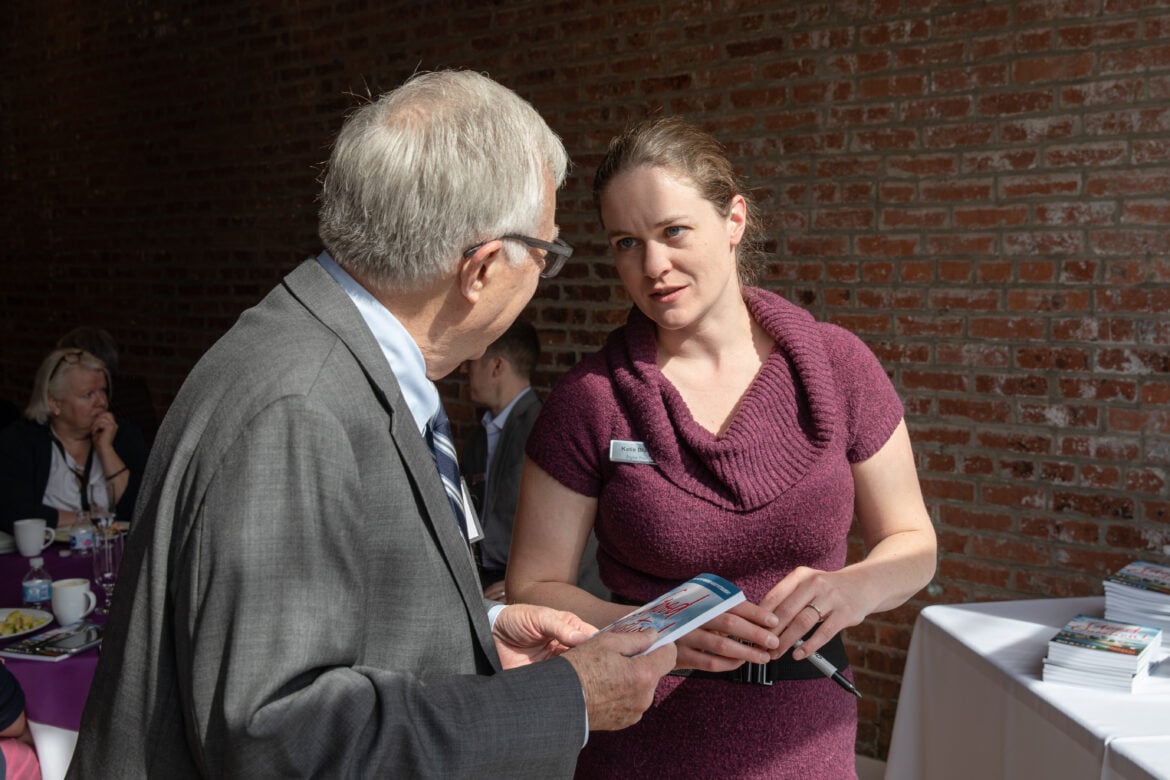
In three words: “Indispensable, generous, leadership”
What colleagues say: Katie is unfailingly cheerful, innovative, enthusiastic and collaborative in supporting and enhancing the ideas and work of others.
She’s also an impressive multitasker. She has to be, given the multiple roles she’s carved out within our newsroom — reporter, fill-in host, gifted and sensitive photographer, intern-program supervisor, podcast host — all in addition to her primary role as the digital editor who oversees our social media platforms and website content. Katie pitches in unfailingly and unstintingly. She’s the kind of colleague who makes a tough assignment more enjoyable — and every assignment she touches better. Through her actions and daily conduct, she has established great trust throughout our newsroom, our company, our community and our network of supporters.
What Katie says
Proudest moment: During the summer of 2020, my colleagues and I spent many days covering local demonstrations against police brutality throughout Pittsburgh. After the first rallies, we made a decision that this was important to our newsroom’s mission. For weeks, we attended as many demonstrations as we could, and connected with organizers and activists of all generations. It was a transformative summer for the city, and I was proud to have been able to amplify the voices of those leading such a transformation.
As intern coordinator at our radio station, it’s also been great to watch our former interns build confidence in their reporting. Many of them continued careers in journalism after graduation, and I love staying in touch with them and hearing about their work.
How her values align with public media: I’m surrounded by people who are committed to serving our audience by uplifting their voices and bringing their stories to Pittsburgh. Public media is thoughtful in how they report on challenging stories. Be it a mass shooting at a synagogue or the killing of an unarmed Black teenager, we take the time to bring in the full context to a story instead of sensationalizing. And public media can be a space to explore the whimsical, the quirky and sometimes nerdy stories that aren’t often told by other media outlets.
Inspired by: When I go out to report a story, I hear about people’s lives and values and how they see the world. It’s inspirational to see the resiliency of communities and to bring those stories to a broader audience.
My fellow reporters, editors and producers are some of the smartest, most thoughtful people I know. I’ve never worked in a place that really feels like everyone loves each other and would do anything to help both at work and in our outside lives.
Advice for other young professionals in public media: Learn as much as you can when you’re younger — you’ll come to understand your newsroom operations and how your company operates. It can be important to know how producers make decisions on what to include or cut in conversations, or why PDs include different shows during specific time slots. By learning more about where you work, you’ll get to know coworkers who you might not regularly interact with. Also, find an advocate — someone who will protect your time and talent while also challenging you to be a better reporter/producer/editor. It doesn’t need to be a formal thing, but knowing that there’s someone at work you can truly trust makes all the difference.
Aliyah Chavez
Anchor and managing editor of ICT Newscast
IndiJ Public Media, Phoenix
In three words: “Young, professional, brilliant”
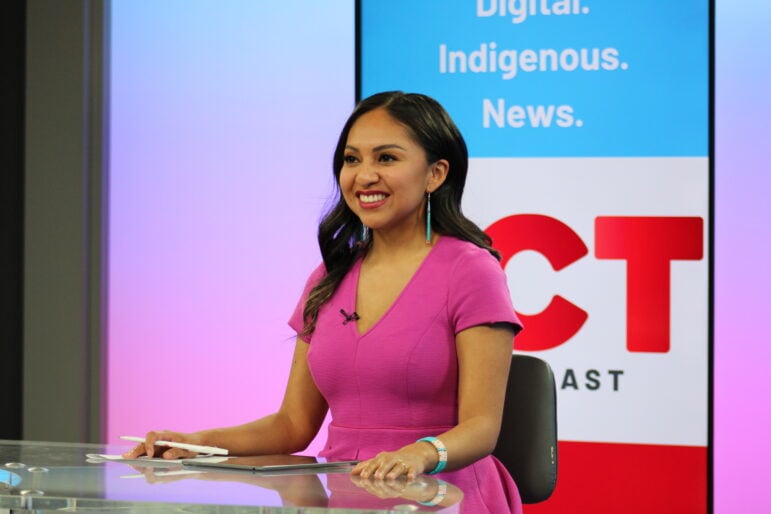
What colleagues say: Aliyah has set the bar high for a new venture, ICT Newscast with Aliyah Chavez. It’s a weekly half-hour news program, usually a five-minute “A” block followed by interviews and packages. The ICT team is small. Since Aliyah was promoted to the anchor role in January 2022, the program has gotten better every day. She looks for ways to tell stories better and improve the look of the program. Her goal is broadcast excellence.
What Aliyah says
Proudest moment: When I interviewed Vice President Kamala Harris. It was an exclusive one-on-one conversation to talk only about Native American communities. It was dedicated to what really matters to the viewers of the ICT Newscast. It was an opportunity I’ll never forget.
How her values align with public media: Being of service to others was one of the values instilled in me since childhood. My tribal nation of Kewa Pueblo is full of people helping one another just because they can. I see my role in public media similarly. It means to work hard to bring high-quality factual news to Indigenous communities because they deserve it.
What inspires her: The time I spendin the community, especially listening to the everyday conversations people have. It could be an elder sharing a new hobby they picked up or a young child talking about a book they read. I find inspiration in the storytelling skills of my family members. Every day and everywhere, people’s lives are full of stories. What could be more beautiful than that?
Advice for other young professionals in public media: Find books, podcasts or television shows to consume purely for fun. As young professionals in public media, it is easy to get swept up in the ever-changing news cycle or feel the rush of constantly moving from project to project. Genuinely enjoying something outside of work keeps my mind sharp — and it’s a great way to make small talk with sources!
Alex Forsett
Director of statewide experience and university partnerships
Rocky Mountain Public Media, Denver
In three words: “Innovative, passionate, responsible”
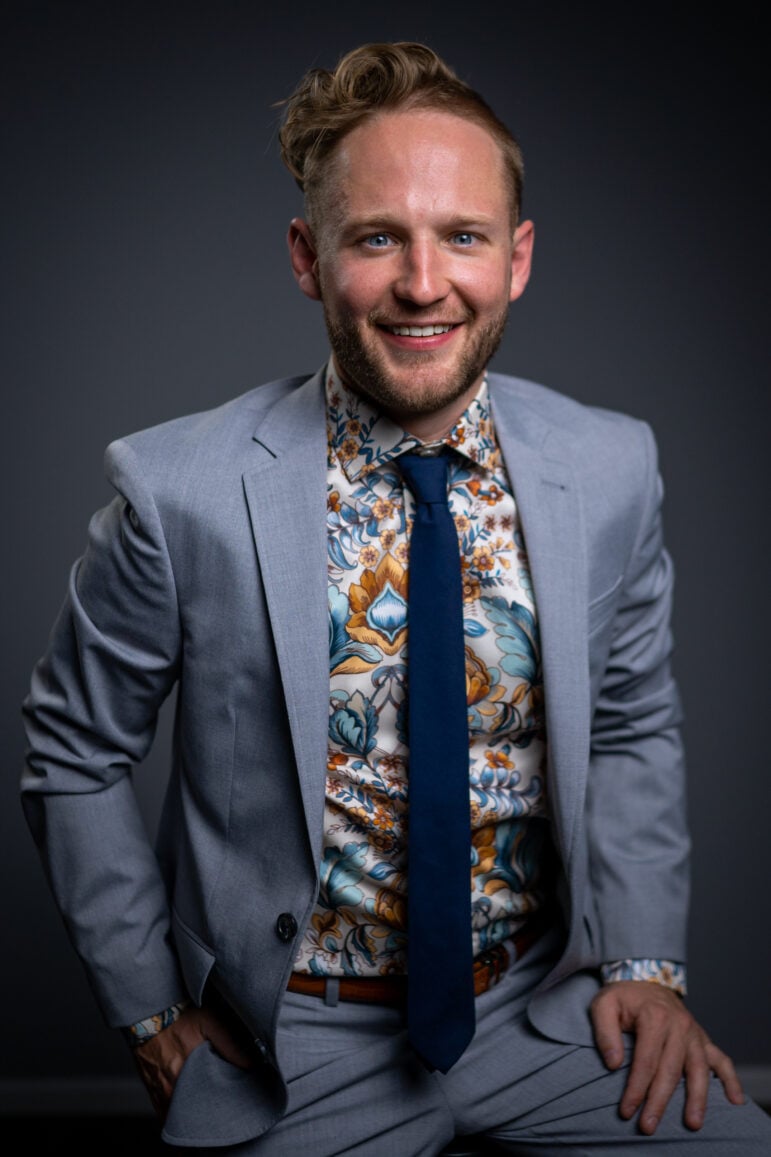
What colleagues say: Alex stands out because he lifts others up and empowers all to become the best versions of themselves through the day-to-day work. His vision has brought to life the future of public media through relevant community co-ownership. He brings such joy and passion to the many hats he wears within the public media system. He makes his colleagues better through his involvement.
What Alex says
Proudest moment: Recently I felt very proud while engaging in healing work with Native communities through Native Lens, an indigenous-led storytelling and workforce development project created through a partnership of KSUT Tribal Radio and Rocky Mountain PBS. This year, a group of 19- to 26-year-old students from tribal communities engaged in an immersive fellowship program supported in part by Vision Maker Media.
After seeing their work, it occurred to me that I had never seen Native community portrayed in this way before — highlighting their power and joy while centering their community assets as they planted feet on land once home to their ancestors. The experience demonstrated to me the importance of consistently engaging in multiple perspectives and public media’s ability to empower historically underrepresented and misrepresented communities.
How his values align with a career in public media: As a son of a family of public servants, the idea of “service” is a key part of my being. I so enjoy engaging in new perspectives and the idea that “there are things in life you will fall in love with, that you have not yet discovered, yet.” This promise of possibility and excitement for life is realized, in part, through service in public media, which holds our own humanity above all else. The diversity of topics, people and perspectives which I discover though my daily work is food for my soul.
Inspired by: I find both solace and inspiration in nature. I know how important time away from work is for my own healing so I might show up to serve at my best. The people who inspire me within public media are truly supportive of their colleagues making space to “fill their cup.”
It’s far too normalized to see leaders who sacrifice their own health and families for their careers. I am not inspired by that. I am inspired by the leaders who practice balance and encourage their teams to do the same. At the same time, I am inspired by leaders who “get stuff done.” I aspire to become a leader who can authentically achieve our mission, while living a life of balance and joy.
Advice for other young professionals in public media: In the words of PBS’ Ira Rubenstein, “Be the one to get stuff done.” When someone says “That won’t work,” be sure to ask “Why?” The models of the past are not the models of the future. Innovate. Test. Learn. Fail fast. Try new things. Rest. Drink water. Be authentically curious. Ask for what you want. Stop saying “I’m sorry” unless you really mean it.
Elma González Lima Brandão
Digital editor
KPBS, San Diego
In three words: “Intelligent, passionate, collaborative”
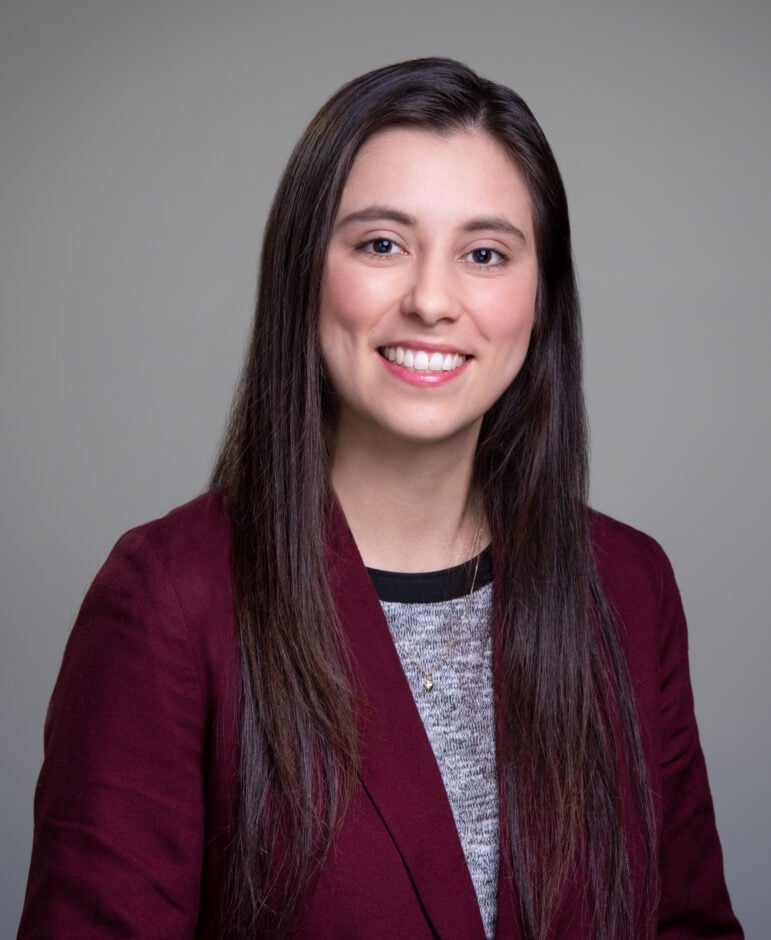
What colleagues say: Elma loves a challenge and is always up to help find solutions to issues small and large.
She is committed to seeking ways to better serve the community. Her specialty is digital content, but she isn’t afraid of using traditional means to reach communities that may need an introduction to that content.
Elma is kind and caring while still holding her ground when she believes strongly in an issue. She teaches and shares her knowledge with colleagues every day, and does so in a manner that makes fellow employees feel capable and excited to learn. She works extremely hard to support the organization’s goals.
What Elma says
Proudest moment: I helped lead KPBS’ 2022 election coverage and worked in a cross-department team that developed a Voter Hub with resources, explainers, a virtual ballot and live results on election night. All content was also offered in Spanish for the first time. In addition to that, KPBS News partnered with community organizations to more effectively distribute the content to Latina/o/x voters and expand KPBS’ reach. This initiative became a blueprint for future efforts to better serve the many communities in San Diego.
How her values align with public media: It’s important to me to work in a mission-driven media organization that constantly seeks to better serve communities — especially those often underserved by the media.
Inspired by: Programs that aim to improve the relationship between journalists and the communities they serve. Hearing about how colleagues find success or what lessons they’ve learned through efforts to engage with communities encourages me to keep trying.
I’ve found a lot of support to continue my professional development. I’ve been lucky to have supervisors who have become great mentors and have given me the right opportunities and responsibilities to continue learning and growing. That has inspired me to try to do the same with any teams I lead.
Advice for other young professionals in public media: Take every opportunity. And fight ferociously to serve the people who need you most.
Sam Harris
Director of membership
PBS Reno, Reno, Nev.
In three words: “Amazing, data wizard, giving”
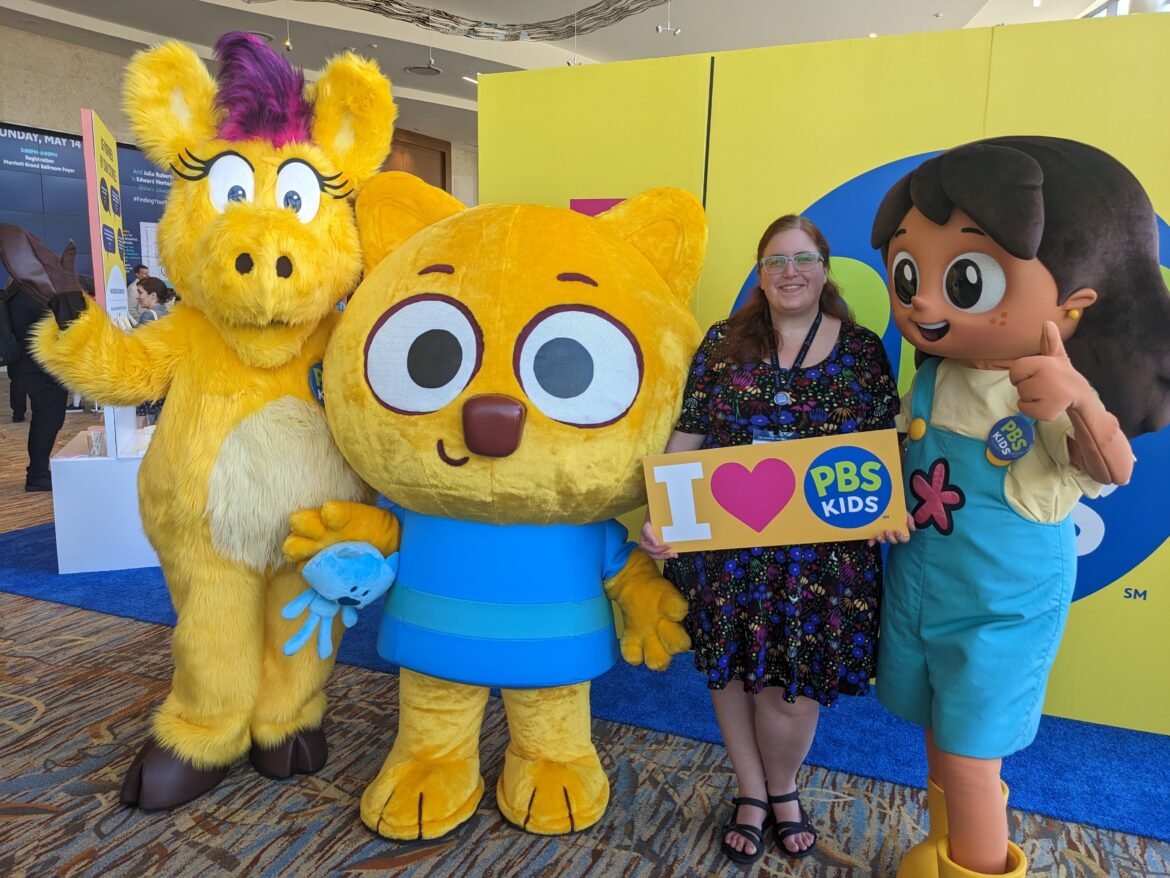
What colleagues say: Sam is a highly valued member of our team, not only for her work in membership but for her willingness to be a mentor and help others grow in their careers. She has taken PBS Reno’s membership to new highs while continuing to find new ways to engage and motivate our community to increase their giving. Her colleagues frequently look to Sam when they need advice or want someone to bounce an idea off. She is wonderful.
What Sam says
Proudest moment: During COVID lockdown, all of us at PBS Reno worked incredibly hard to keep our community connected, especially with our Better Together program and Camp Curiosity at-home learning initiative. Highlighting essential workers and volunteers in our community and being a platform for supportive messaging during uncertain times made me feel the impact of our work in public media more than ever. I’m incredibly proud that my work in fundraising helps empower my talented and creative colleagues across departments.
How her values align with a career in public media: Before working in public media, I was a public library archivist tasked with processing historical information and making it accessible to as many people as possible. Community access to quality and trustworthy content is very close to my heart.
Inspired by: Co-workers at my station and others. The passion they have for what we do, the content we create and the public we serve makes me want to do better every day.
I grew up watching PBS, and the pride my family has in my chosen career drives me to keep going and reaching outside of my comfort zone.
Advice for other young professionals in public media: Don’t be afraid to ask questions or reach out to your peers at other stations. It is important to respect the work done by more experienced colleagues, while also giving yourself space to try new things. Those new things might not always be absolute successes, but innovation and growth through learning are their own rewards.
Gavin Lankford
Assistant director of current series
PBS Kids, Arlington, Va.
In three words: “Dedicated, creative, innovative”
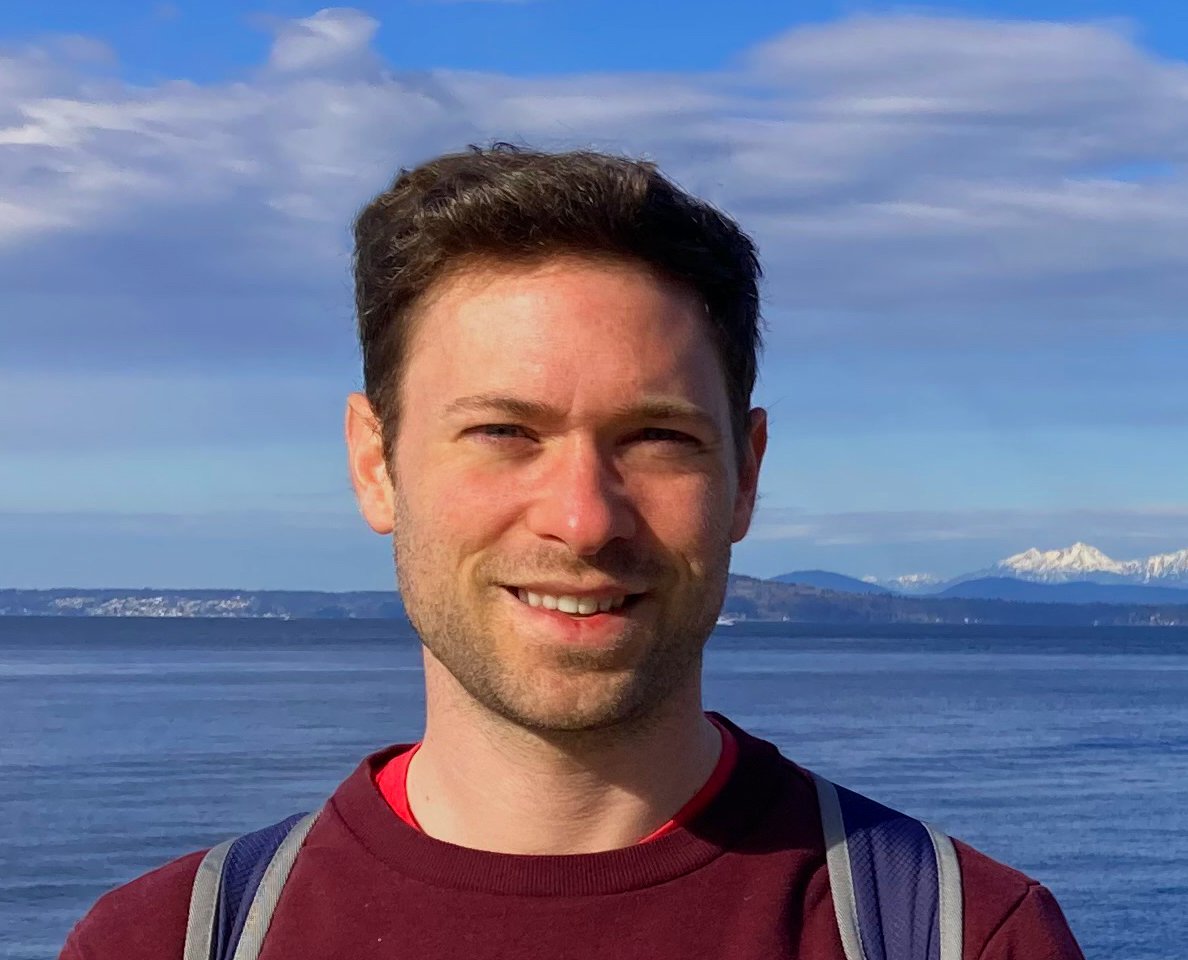
What colleagues say: Prior to joining PBS, Gavin worked as a production coordinator on Season 1 of Molly of Denali at GBH Kids, contributing significantly to the success of the groundbreaking series. The insights and experience Gavin gained working at a producing station have made him an incredible content executive, responsive and sensitive to the needs of both public media producers and member stations. He provides constructive feedback at every stage of production, helping producers and creators achieve their vision in a way that will resonate with our audience and meet our goals around curriculum. Gavin also has a BFA in animation and great creative instincts, which make him a huge asset to the PBS Kids team.
What Gavin says
Proudest moment: Every time a new program I’ve worked on launches on PBS Kids, I feel incredibly proud. It’s always so exciting to finally share something you’ve helped to create with the world and witness its impact on kids and families — especially if it’s a project you’ve watched grow from pitch to pilot to series production to premiere.
How his values align with public media: I believe strongly that, in addition to providing educational and entertainment value, high-quality kids’ media should be accessible and reflective of the diversity of its viewership. I’m grateful to find myself within an industry that values authentic, positive representation in its content and is committed to distributing it to the widest possible audience.
Inspired by: Hearing and seeing the effect our content has on the audience is hugely inspiring. Whenever I run into a parent or kid telling me about their favorite characters or episodes — or just something interesting they’ve learned from one of our programs — it makes all the labor of creating the content worth it. I’m also constantly inspired by the producers and production teams we partner with. The creativity and passion they put into their projects is a huge motivator for me to continue the work that I do to develop, support and distribute their shows.
Advice for other young professionals in public media: Always try and find the fun in what you are doing. What is it about the project or role you are performing that makes you smile or know it eventually will bring enjoyment or value to the audience? Those moments are what make all of the work worth it.
Whitney Maddox
Director of DEI
NPR, Washington, D.C.
In three words: “Authentic, sharp, inspirational”
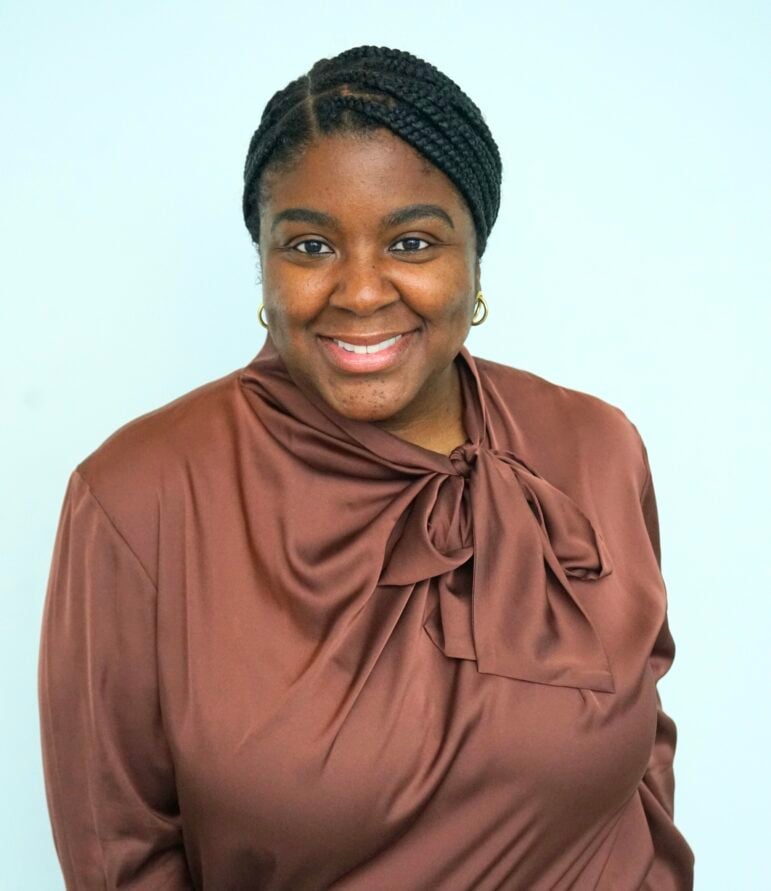
What colleagues say: Whitney is a thoughtful, curious, committed professional who clearly sees the connection between the work she does and the people we serve in public radio. She moves easily through disparate parts of the organization — equally at ease talking with journalists, fundraisers or technicians — and is just as deft at making people feel seen and heard, regardless of where their work lives. She can cut through the muddle of discourse on DEI matters to deliver sharp insights with a balance of passion and humor, so people leave her sessions inspired and intact. She can see big-picture concerns at the strategic level or help two people work out a problem across cubicles.
Her influence spans the whole of NPR, many stations across the country and industry-level organizations. Since introducing STAR (Start Talking About Race) to NPR and stations in 2021, she has held twice-monthly workshops with staff. Through her efforts, we have maintained a challenging, quality conversation about divisive issues that has touched hundreds of staffers. Whitney also led a two-year focus on addressing disparities in the experiences women of color had at work compared to their colleagues. This effort that has spread across the company to the benefit of everyone else.
What Whitney says
Proudest moment: Before I came to NPR in 2021, I designed and launched STAR, a dialogue-based program that addresses how race impacts how we show up and do business. This May marked two years that we have held twice-monthly dialogues about race and ethnicity at NPR. In that time, I have facilitated STAR with more than 1,000 staff members and member-station colleagues.
Nothing is more rewarding than knowing there are people willing to get in the trenches with me and say the hard things that need to be said.
How her values align with public media: The mission of public media is to create a more informed public — one challenged by a deeper understanding and appreciation of events, ideas and cultures. That only happens if we tell stories that have historically been left out and talk to the people who have been ignored or forgotten. I value going beyond the status quo and pushing past popular solutions in order to highlight the inequities and systemic discrimination that marginalized people continue to face.
Inspired by: Women of color. I have always been surrounded by Black women and other women of color who pushed through barriers, spoke up when they were the one-and-only and lived through moments that made them resilient.
Since I was a little girl, I’ve seen Black excellence on display through my mother, grandmothers, aunts and sisters. Now, I have new inspiration every time I look into the eyes of my four nieces and I am reminded of why I go so hard. If I can help it, they will never question if they belong or if their hair or skin is beautiful. They will be confident walking into the boardroom because they know their Auntie Whit paved the way for them to be there.
Advice for other young professionals in public media: I want to specifically give advice to those who walk into their newsrooms or offices and find that they are the one and only — whether because of their race/ethnicity, religion, gender identity, etc. You will be more inclined to think that things won’t change because there’s only one of you. You will likely get pushback — on your writing, speaking and even ideas — that your peers are not getting. All of those things will make you want to run in the other direction. Before you run, seek out a mentor within your organization and someone external to your organization. See if the guidance and wisdom of others can help you navigate what feels like impossible territory.
I know what it’s like to be the only one in a workplace, and I also know what it’s like to be the one who caused change to happen. Your voice is needed in that organization if our communities are to have a resource and an advocate to tell their stories. The questions that you ask and the belonging that you seek are vital to your organization being successful. You are the reason that your organization will be around another 10 years. Don’t you dare dim your light because somebody else doesn’t appreciate your shine!
Savannah Maher
Reporter
Marketplace, Albuquerque, N.M.
In three words: “Enterprising, hard-working, collegial”
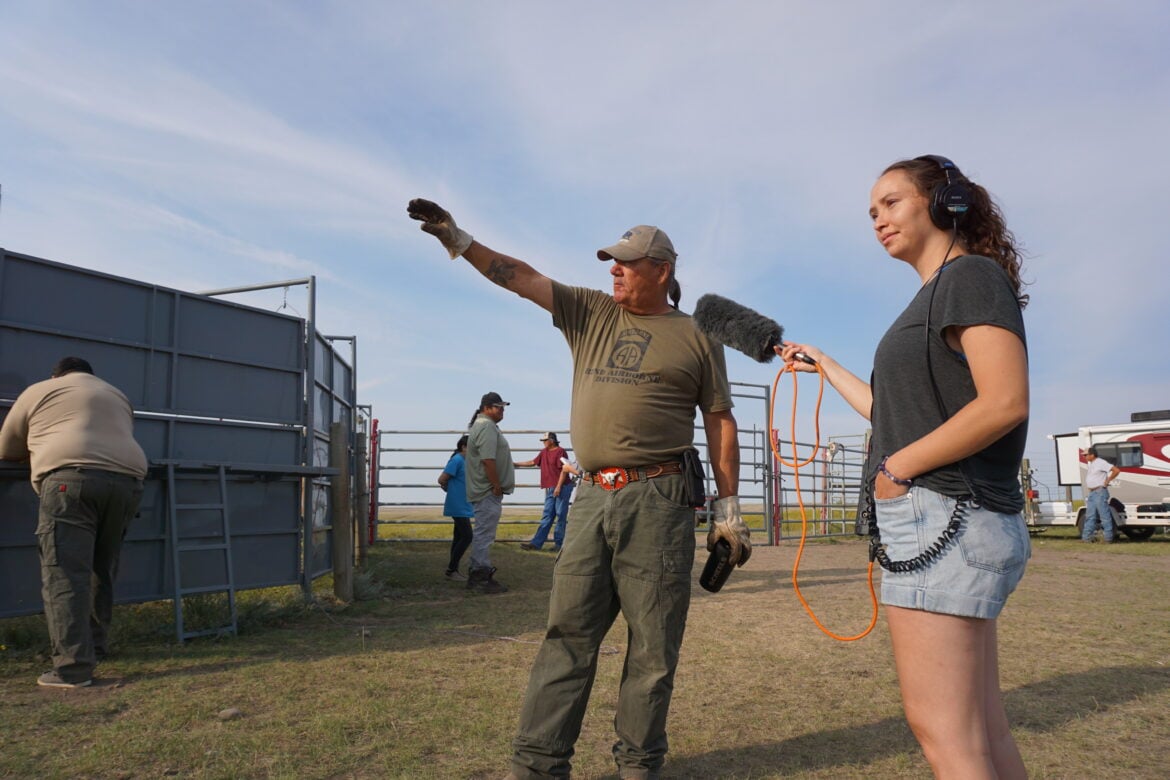
What colleagues say: Savannah’s expertise in the issues affecting Indigenous peoples in the economy, as well as her deep knowledge of water issues in the American West, make her a unique asset. She has brought new perspectives from Indigenous peoples to stories about business and the economy as well as covering stories about business and the economy on Indigenous lands. She was recently assigned to the team of our award-winning podcast How We Survive, which this season is looking at the climate change–fueled water crisis in the West. She shows her leadership qualities through her role on the board of directors of the Native American Journalists Association.
What Savannah says
Proudest moment: Any time an Indigenous listener writes to say they appreciate hearing Indigenous voices and stories on Marketplace. And whenever someone from back home says they heard me on the radio and it made them proud.
How her values align with public media: I grew up with teachings about the value of reciprocity. In its purest form, and when we’re doing it right, that’s what public media is about.
What inspires her: I serve on the board of the NAJA, which means I get to spend time scheming and strategizing about the future of Indigenous journalism with some of the most driven and visionary folks in the business. My NAJA colleagues have served as community watchdogs reporting for tribal papers, blazed trails and built Indigenous affairs beats from scratch at big mainstream publications. They’ve bravely pushed their tribal governments to adopt press freedom protections. When I start to lose sight of what made me want to become a journalist in the first place, this group reminds me.
Advice for other young professionals in public media: To early-career Indigenous journalists specifically: Be picky about who you work with. Our skills are in high demand right now. Mainstream journalism is waking up to the fact that it can’t report ethically or accurately on our communities without hiring Indigenous journalists.
When you’re just starting out, it can feel like every job offer or freelance opportunity is the best and last one that will come your way — or that you’re lucky just to have a place in this competitive industry. Trust that the opposite is true. Treat job hunting like a reporting assignment. Does the outlet or editor have a track record of supporting journalists from marginalized backgrounds? Are they prepared to help you grow, stand up for your work and trust your expertise? These are the questions you should be asking before you say “Yes.”
Obed Manuel
Editor of Denverite
Colorado Public Radio, Centennial
In three words: “Thoughtful truth finder”
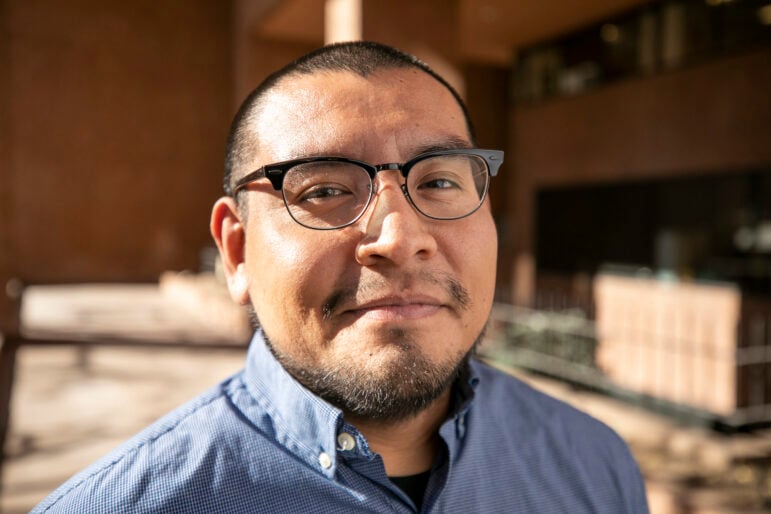
What colleagues say: Obed brings a combination of strong journalism skills, cultural curiosity and authenticity as an immigrant to the U.S. who is deeply connected to his Mexican roots. He combines those qualities to direct his team towards stories that other outlets don’t cover, or to different approaches than what you’ll find in other local media.
As a leader, he sees the contributions of people in various roles on the team, and he makes sure they get the public acknowledgement they deserve. He goes out of his way to build connections among different sections of the newsroom.
And — this is probably what makes him stand out the most — Obed is deeply audience-focused. He regularly sets aside the “old rules” in favor of choosing stories and approaches that matter to people’s lives.
What Obed says
Proudest moment: We hosted a forum in March with the top candidates running to be Denver’s next mayor. It was a significant election, as the outgoing mayor had been in power for 12 years. Our forum was entirely focused on highlighting issues of special importance to communities of color in the city.
As I stood before the candidates and welcomed the in-person and digital audiences, I turned to the candidates and said, “The person who wins the election has the responsibility of making sure that your policies work for everyone in the city.” It felt amazing to stand there and say that to those folks, some of whom are already elected officials. After the event, many people in the audience told us our forum added something fresh to the mayoral race.
How his values align with a career in public media: Public media is almost a lifelong journey. I’ve benefited since I was a child learning English and watching programs like Arthur on KERA in Dallas. I now listen to Colorado Matters to better understand the culture of the state I now call home. The news, actionable information and education content that public media provides for free to everyone is exactly why I practice journalism. To be able to do this work in a space where there aren’t for-profit interests that could undercut the newsroom is all I could ever ask for.
Inspired by: The people I’ve written about, and their sometimes harrowing personal stories, often are what keep me going. Each of their stories has mattered, from the community organizer building a platform for change to the single mom who brought her children to the U.S. for a better life. I also always think of the neighborhood where I grew up — Oak Cliff — and its people.
Advice for other young professionals in public media: Take your time. Enjoy the work you’re doing and make the most of it. Use your reporting opportunities as moments to learn, grow and become better. Doing that will equip you to take on bigger roles and advance your career. Don’t compare yourself to peers working at bigger (state or national) news outlets. Doing so will distract you from your goals.
Brian Munoz
Staff photojournalist and multimedia reporter
St. Louis Public Radio
In three words: “Ambitious, passionate, brilliant”
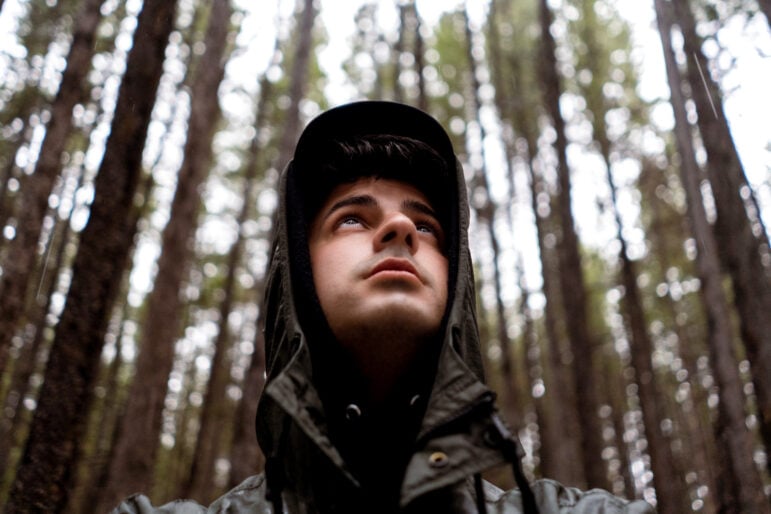
What colleagues say: Brian is a deeply empathetic photographer whose sensitive and respectful approach to his work earns a level of trust with sources. This shines through in his images and often grants him access not afforded to other journalists. Brian is equally clutch in breaking news situations, always meeting the moment. I also admire how Brian embraces a media literacy mission, both in the field — explaining to hesitant subjects the process of how he works and how the images will be used — and in his work with young aspiring visual journalists in our St. Louis Public Radio Teen Photojournalism Prize. As one of the youngest members of our newsroom, Brian is a natural leader. He’s quick to take interns under his mentorship wing and provides guidance to new hires. He has a bright future ahead of him.
What Brian says
Proudest moment: One thing binds the handful of “proud moments” that come to mind — our community. I’m always trying to think about those whose voices are being listened to at the metaphorical table and those whose voices aren’t.
This concept is a guiding force in various efforts I’ve championed at St. Louis Public Radio, including helping organize Missouri’s first public media union, launching the Spanish-language content section on our website and supporting our various photojournalism education outreach efforts with local youth and students.
How his values align with public media: It would be safe to say many of us go into journalism looking to spark change in the world through storytelling — a sincere quest to find and share those common threads that tie us together, no matter our background or location. A high-quality, unbiased and independent press is critical to our democracy and should be available to the entire public and not just those who can afford it.
Growing up in a lower-income household, I came to appreciate public media like NPR and PBS because I knew they were easily accessible and trustworthy. The continued push to eliminate barriers for people to be reflected in our reporting or to consume our programming is why public media so closely aligns to my personal values.
What inspires him: Throughout my career, it’s been my industry peers. Whether it’s working at a scrappy daily newspaper in rural southern Illinois, a national outlet or in public media, my colleagues have often been the ones pushing to pursue stories and projects that mattered to me while fighting to ensure our workplaces truly work for everyone. Being able to learn from both veteran reporters who know the lay of the land and young folks who want to shake things up has been invaluable.
Advice for other young professionals in public media: Don’t feel like you have to have everything figured out. A lot of us actually don’t — in our day-to-day work or our long-term careers. Life, much like journalism, is an experiment in learning and adapting to the unexpected. If you’re kind to others, stay curious, keep an open mind and are willing to ask for help when you need it — you’re going to be okay. People want to see you succeed.
Don’t let journalism consume you. We love what we do, even though it’s a grind at times. Make sure you have outlets other than journalism — whether it’s sports, reading, video games, music, anything else. As much as I appreciate my co-workers, I deeply love my friends who don’t think in ledes or airtime. They are critical to making sure I’m not on work-mode 24/7.
This field isn’t a sprint, it’s a marathon, and you need to make sure your support system is there to give you glasses of water along the way.
Nicholas Price
Series producer
Reel South, a documentary series produced through a collaboration of PBS stations in the Southern U.S.
In three words: “Creative, insightful, dedicated”
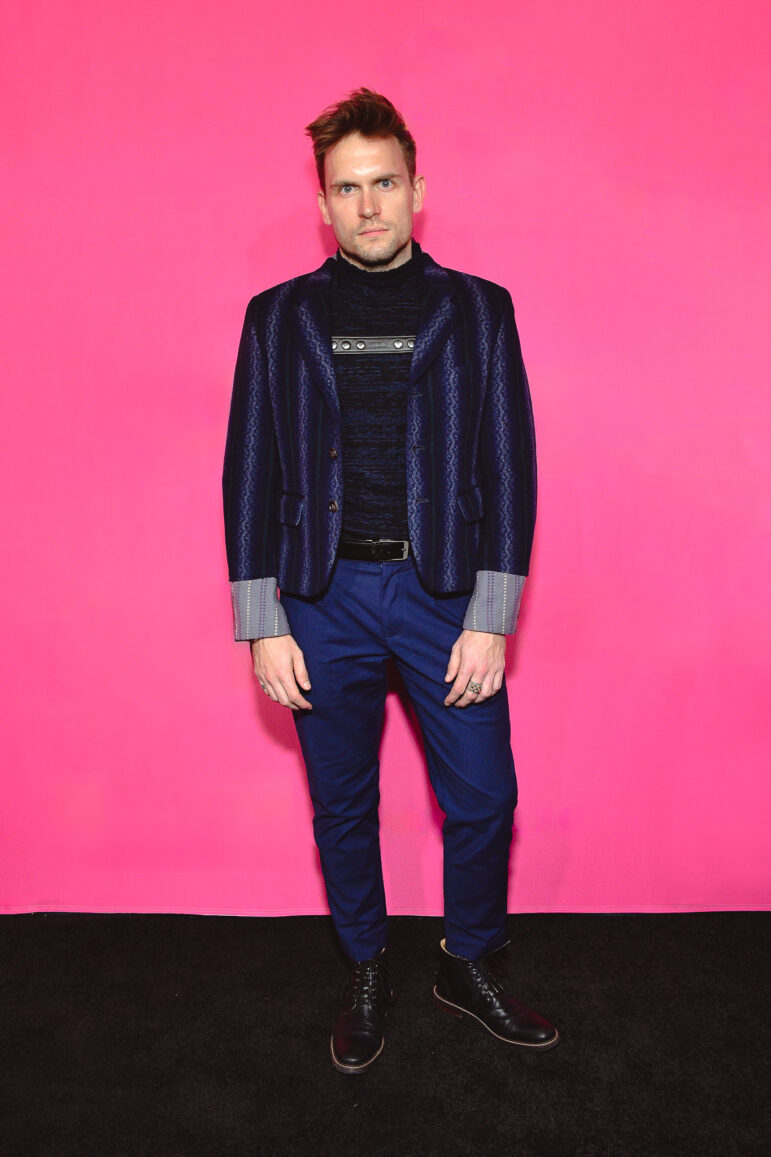
What colleagues say: Nick is an engaged and collaborative producer working to bring underrepresented stories from the South to our member stations.As a strand of programming, Reel South continues to punch above its weight class in what they’ve delivered for public television release. This is in part due to Nick’s tireless efforts on behalf of his series.
What Nicholas says
Proudest moment: Whenever an independent filmmaker approaches me — whether or not they have a film to pitch — to tell me that Reel South feels like a lifeline for them or that they appreciate the opportunity it provides for them and their peers, I remember that outside of my apartment, beyond the confines of my desk/kitchen table, there are great stories to be connected to an audience that needs to witness that story. And I see the impact that Reel South has carved into the South’s creative/filmmaking economy.
How his values align with public media: Most media companies want to tell good, entertaining stories. Public media doesn’t own that honorific exclusively. Public media wants to allow each community’s creatives to tell those stories. There’s an obvious and important local mindset to content in public media.
Public media stations are providing opportunities for talented writers, creators and video-makers from their own backyards to contribute to this important conversation. I appreciate that the stations are often the only place in rural or even suburban America that nurture hometown creative media talents.
Inspired by: Talented leaders in the system who have committed virtually their entire careers to working in public media and are still willing and eager to innovate and adapt to the needs not just of an industry but also of an audience. My own mentor Rachel Raney is a great example of someone with this mindset as well as folks at the public media–aligned organizations like the Center for Asian American Media, Black Public Media, Latino Public Broadcasting, Pacific Islanders in Communications, and Vision Maker Media.
Advice for other young professionals in public media: Learn everything and admit what you don’t know. My curiosity has never been limited to the story I’m trying to edit, write or record.
Learn about systems and how it all works — everything from the accounting processes of your station to the language requirements of legal contracts, and the groundskeeping and maintenance of the towers outside your cubicle window. Understanding public media as more than the content has been insightful for me creatively as well as professionally as I try to continue to commit my skills, interests and talents to this service.
Anita Rao
Host and creator of Embodied
North Carolina Public Radio/WUNC, Chapel Hill
In three words: “Compassionate, tenacious, curious”
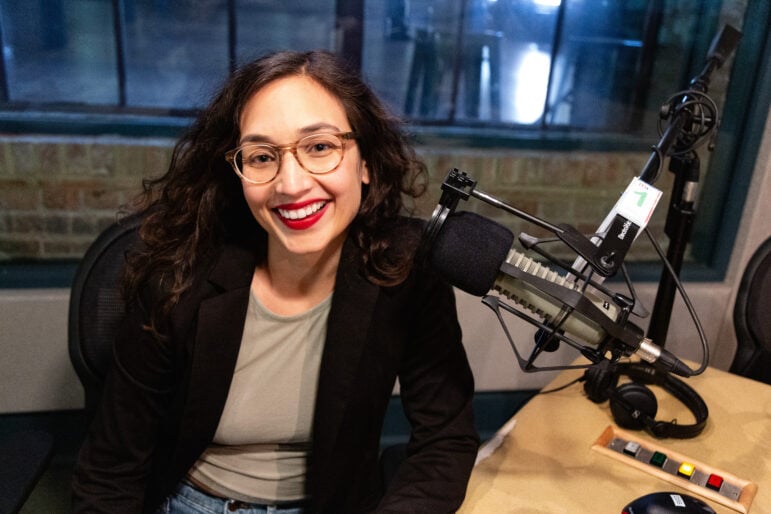
What colleagues say: Anita is passionate about exploring identity, connection and power through storytelling. She grew up in an immigrant, mixed-race family in the Midwest, and this constant straddling of multiple worlds fuels her curiosity.
She is invested in creating an open space for dialogue about taboo and uncomfortable topics. She approaches every conversation with professionalism, grace and empathy. She is not afraid to break rules and challenge the norms of her field and industry.
As host of Embodied, a series about sex, relationships and health that she created and launched, Anita has hosted weekly conversations that blur the lines between “experts” and “everyday people.” She is intentional about working with her team to build a show that foregrounds personal narratives of folks from a wide array of backgrounds, experiences, ages, gender identities and expressions and abilities. In 2022, most guests identified as nonwhite. About 70% of guests identified as women, and more than 10% as non-binary or gender-fluid. Embodied has integrated these audiences into its DNA and is connecting content for, by and about them every single week.
What Anita says
Proudest moment: Embodied was born during the pandemic. For a long time it was hard for me to visualize how the content was resonating with folks out in the world. In October 2022, my team and I partnered with a local storytelling nonprofit to host a live event that was part late-night talk show and part live storytelling. We rented a community venue, had a live DJ on stage and featured five amazing storytellers talking about their own experiences with purity culture.
I remember walking out on stage to kick off the show and looking out into the audience. It was then that I could really feel for the first time what this thing was that we were doing! Something that started as an experiment to explore topics I cared about had turned into a real, tangible thing with the power to gather hundreds of people in support of honest, vulnerable storytelling.
How her values align with a career in public media: I learn best through stories, and this has been the case since I was a kid! My family didn’t have a TV until I was in fifth grade, so I was a nerdy bookworm who spent a lot of time at the public library. I was also raised in an immigrant mixed-race household in the Midwest. This constant straddling of multiple worlds fueled my desire to understand how other people make sense of their own identities.
I was drawn to public media in large part because it was the place where I saw the kind of storytelling that reflected how I enjoy learning about the world. Public media stories and interviews are often fueled by deep curiosity, empathy and a desire for seeking out diverse points of view.
Public media creates ample opportunity for exploring why we think the way we do. As a supervisor once told me — it’s the home for lifelong learners, which is certainly how I identify!
Inspired by: In 2016, I participated in the first-ever Werk It Festival from WNYC, which invited women and nonbinary folks in the podcasting industry to gather for conversation and connection. So many experiences and interactions from those few days continue to serve as inspiration in my career today. That festival opened my eyes to the depth and breadth of possibility in the podcasting space and empowered me to find and develop my own voice as a host.
The second big source of inspiration comes from a program I’m currently participating in — the Online News Association’s Women’s Leadership Accelerator. It has been such a gift to get to know a group of women from so many different parts of the field. This experience is giving me the opportunity to reflect on how I want to show up as a creative and leader both inside and outside the workplace.
Advice for other young professionals in public media: Build and foster relationships with both mentors and sponsors. Mentors are the folks who will teach you the rules of the road and guide you through challenges, decisions and roadblocks. Sponsors, on the other hand, will actively advocate for and open doors for you — even when you are not in the room. Decision-making in public media typically happens in a pretty hierarchical way, which makes cultivating relationships with both mentors and sponsors really important.
Change in public media is slow. This is not an industry in which you can go from idea to execution overnight. Every project I’ve developed or new role I’ve taken on has been a result of my speaking aloud — over and over again! — to sponsors about the things I want to see and do. My mentors, on the other hand, have helped me step into my power. They also remind me what that power is when I’m feeling uncertain or struggling with imposter syndrome!
Jessica Ray
Digital producer of MotorWeek at Maryland Public Television in Owings Mills
In three words: “Intuitive, resourceful, proactive”
What colleagues say: Jessica is focused, organized, resourceful and creative in all her roles and assignments. She also brings energy, fresh thinking and new perspectives to our productions. And she’s proactive in seeking ways to improve our editorial content.
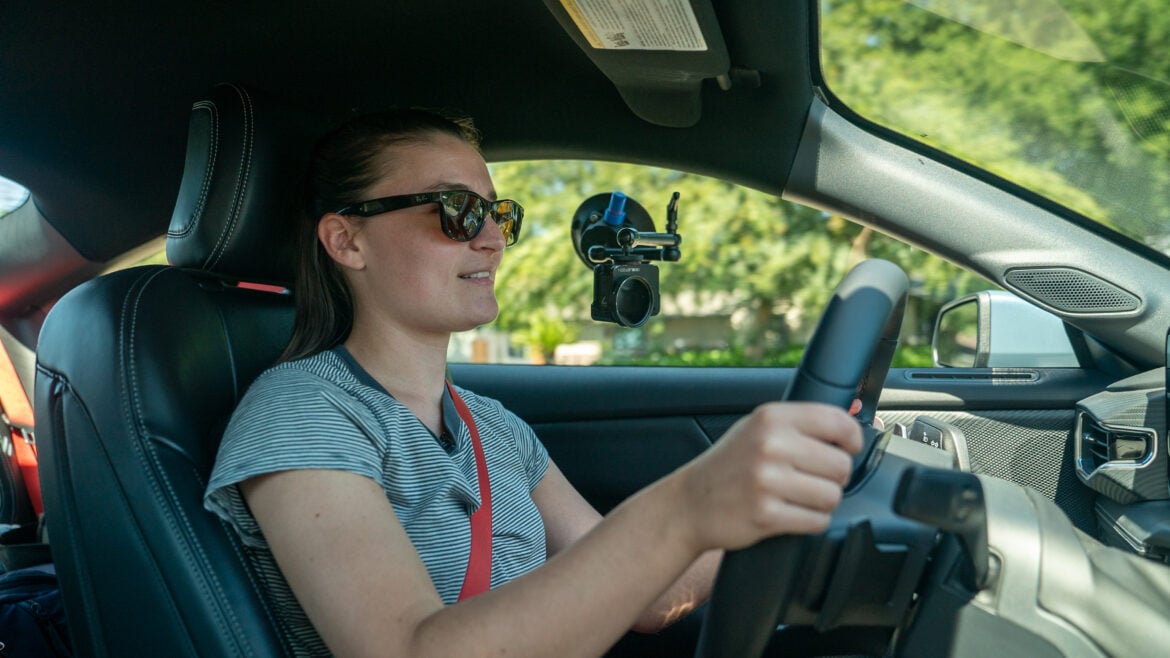
Jessica provides valuable feedback and analytics to help guide and enhance the impact of MPT’s social media engagements. She also has the drive and confidence to accept new challenges. For example, she recently stepped from behind the scenes to work in front of the camera as a commentator for MotorWeek.
What Jessica says
Proudest moment: Over the last few years, I have taken a larger role on the production team that now includes being on-camera. That sometimes includes testing new cars by driving in high-performance situations on road courses and raceways. Being able to coherently verbalize how a vehicle is driving while at 130 miles per hour is not easy.
When I visited Willow Springs Raceway to do a “First Drive” MotorWeek segment on the 2022 Porsche Taycan GTS Sedan, I had track-driving experience, but I hadn’t ever done on-camera track impressions. I drove on the challenging Big Willow circuit and something in my mind clicked. Imposter syndrome faded away, and I was able to articulate exactly what I was experiencing.
How her values align with public media: Public media’s primary mission is to enrich lives and serve the public by providing entertaining, informative and educational content. I started my public media career working in local programming, specifically on a weekly series Artworks, which gives a platform to artists in Baltimore and other areas in Maryland. I met many amazing artists who were so grateful that we were shining a light on their art and sharing it with the people of Maryland. Meanwhile, my MPT co-workers were producing stories about local farmers, highlighting the state’s natural beauty, reinforcing the importance of the Chesapeake Bay and keeping viewers informed about Maryland government and public affairs. We feature stories about topics that serve the public and impact our communities in positive ways. Being part of that is very important to me.
Inspired by: So many times I have run into a colleague in the hallway, started a conversation and left that conversation with the spark of a new idea. That person could be in a different department but their outside perspective could be incredibly helpful. These impromptu interactions stopped when I started working from home during COVID-19, and I realized how important they were. Being back in the office now, I’m happy to benefit from the inspiration that comes from these encounters!
Advice for other young professionals in public media: Always remember the mission of public media and how we affect the lives of people who watch or listen to our content. MotorWeek, a well-known national series, has an established viewer base, and I constantly receive feedback from our viewers. When I worked in local programming, garnering viewer feedback was rare. That could be discouraging, but it didn’t mean my work then was any less important than it is now. The mission and our impact are the same.
Lewis Reining
Producer and operations director
WTJU, Charlottesville, Va.
What others say: “Clever, creative, adaptable”
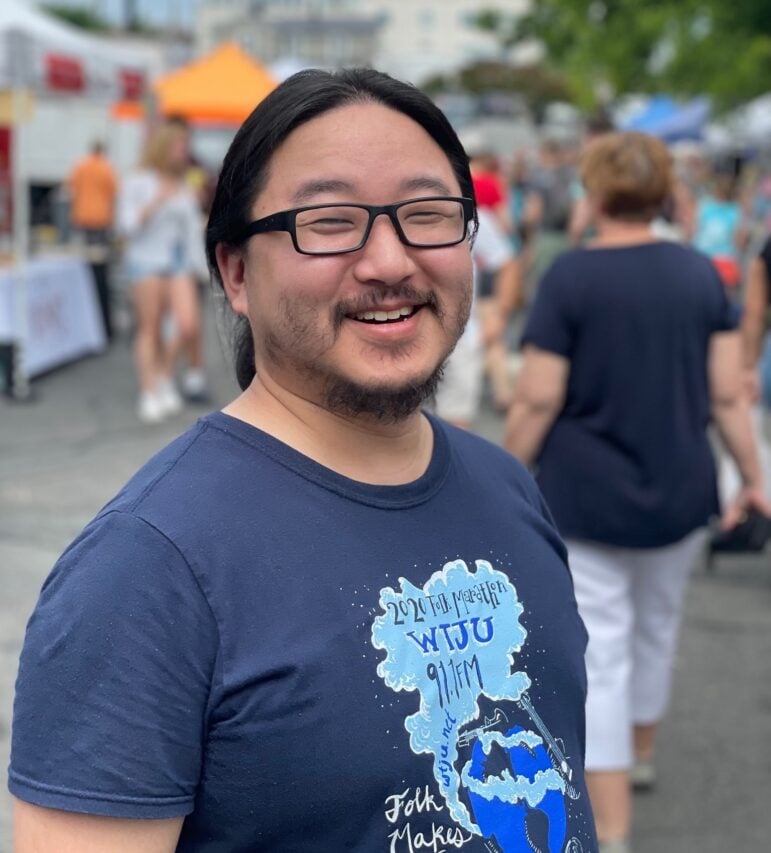
What colleagues say: Lewis is multitalented in a way that’s hard to adequately describe. He loves using a variety of technical tools to produce things that are creative and good — from live concerts to audio dramas, youth summer camps and unique on-air promos. Lewis works hard and is tenacious at solving problems. He is down-to-earth and works very well with a large and diverse pool of WTJU volunteers and staff. He is willing to help and always there in the clutch.
What Lewis says
Proudest moment: I’ve had the distinct honor of participating in some notable projects: managing production of a free online music history class covering 100 years of recorded jazz, engineering incredible musicians like John Doyle and Mick McAuley, and helping to organize and run outdoor community concerts with 1,000-plus people in attendance. And yet, if I’m honest, the proudest moments that spring to mind are small.
WTJU is primarily a music station. All of our shows are hosted by community members who volunteer their time to share their love of music.
A few years ago, one of our DJs had two hours of music prepared on a laptop they brought in, but couldn’t get any of it to play for a show they’d spent hours planning. It was an easy fix, just an issue with the audio output device. A few seconds, a couple mouse clicks, and everything was back to normal. Their relief and smile when they knew that hard work hadn’t been wasted let me know that I’d helped make their day easier. For me, there’s been no greater satisfaction than helping your neighbor and seeing the immediate impact of your help.
How his values align with a career in public media: I grew up on public media and originally wanted to be a radio journalist, someone bringing people the news, making the world a better place with the power of the pen (and mic). Where I’ve ended up is vastly different from my original vision. I’ve come to understand that there are lots of other ways to help build a better community. The news can inform, but it can’t necessarily give a sense of fulfillment or help you through difficult moments. Music and the arts can.
Community stations like WTJU are uniquely positioned to help. Our hosts produce their own playlists and structure their own shows. It’s one person reaching out to their community and saying, “This is what I’m thinking, how I’m feeling, this is what moves me” and why. There’s a beauty in that selfless vulnerability. There’s no money, no real fame or fortune, but they do it anyway. And in so doing, they contribute in building a piece of the unique character of Charlottesville and Albemarle County.
Through WTJU, I’ve learned that teaching and empowering others with the tools to tell their own stories and seek out their own truths is equally important in creating a better community. From our student summer camps to classes for University of Virginia students and DJ/host-training for community members, I’ve learned that helping sometimes means stepping back a bit. I provide support to bring people together through music and concerts, and by empowering them with the skills and tools to speak their own truths. It’s an equally important function to journalism.
Inspired by: As an avid listener, I make time to seek out new music. Recently, I was inspired by Dogtown Studio and their work with the band Crane Wives. I started listening as an audio engineer, trying to break down the way the instruments were layered, how they fit into the soundscape and how that was achieved. Finding a work that moves me becomes a great source of inspiration. It’s a great way to give me direction in my own self-improvement.
Another source of inspiration is teaching. In showing interns and students the basics of recording and editing, they sometimes ask questions that I don’t know how to answer. Their questions have made me reexamine my patterns of habit and actively relearn the tools I’m using.
A third is asking myself how I could represent “this” or “that” in an audio-only format. When I’m out and about, I stop and listen for a minute to see what the key sounds of my environment are. Or when I’m watching a film, I consider how I would adapt that scene to audio-only.
Advice for other young professionals in public media: Do everything with intentionality and consistently review your own work. By maintaining intentionality in all aspects of production, your ability to analyze and improve becomes much easier.
Creating media is often messy, complicated and multilayered. Trying to improve and strengthen your craft can be difficult because there are so many different angles to consider. Having strong intentionality isn’t just about why you chose speaker A over speaker B, it’s about why you chose clip 3 over clip 7, why you wanted the order to be clips 3-5-2 and why you wanted the music to end 2 seconds before the last clip instead of with it. It has nothing to do with whether these were good or bad decisions, just why you made them.
A second bit of advice is for all of us: Carefully consider what you need on a personal level. Work in public media is often all-consuming, even when you try to keep a good work–life balance. It’s often because the work is close to the heart and we care about getting it right; and that takes time — a lot of time. But that doesn’t mean you don’t need other outlets and pursuits.
I love the work I do at my station, I love the people I work with and I think it’s impactful, meaningful work. But most of my work is technical and supportive in nature. Over time I’ve come to understand that I need a creative outlet, I need to be able to take ownership of an idea and be able to build it as I see fit. So I’ve started working on creative stories and scripts. That side of me, even if it’s not in a professional capacity, is just as important to my own well-being.
In jobs like ours where the work is always geared toward serving and supporting others, it’s easy to forget to take time for yourself.
Micaela Rodriguez
Managing producer of podcasts
North Texas Public Broadcasting, in Dallas
In three words: “Thoughtful, motivated, playful”
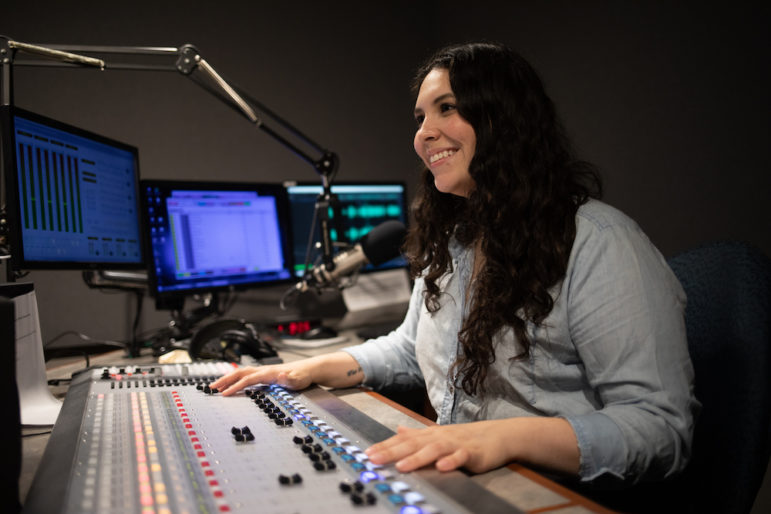
What colleagues say: Micaela takes DEI seriously and incorporates it seamlessly into her team’s work. She champions including the audience in show ideation, development and production, and pushing the limits and expectations for what public media can do. She is incredibly invested in her team, encouraging them to apply for career development training and fellowships. She is active in news organizations like the National Association of Hispanic Journalists and Online News Association, and has completed fellowships like NPR’s Next Generation Radio Early Career, the Maynard 200 program and a fellowship hosted by YouTube in collaboration with the Maynard Institute. She attends conferences yearly to share her podcasting and digital expertise, and to learn from others.
What Micaela says
Proudest moment: When we were selected to participate in the Ready To Learn Podcast Accelerator. The experience gave us time and funds to explore, adjust and reimagine our podcast. It has been fun and rewarding to collaborate with the education team on a community-based podcast with the potential to reach beyond the Dallas-Fort Worth Metroplex.
How her values align with public media: The things I value most are curiosity and playfulness. Public media is in a moment of growth and change. We need to reinvent ourselves and adapt to the changing media landscape and an audience that is searching for new, unique and interesting curated content — while they already have a smorgasbord at their fingertips. There couldn’t be a better time for experimentation, failure, rebirth and fun.
Inspired by: Podcasting has taken a hit this year, but I’m inspired by the medium’s ability to push on. Data shows that more people than ever are listening to podcasts. I think podcasts are being reborn as something new, different and far more accessible. I’m particularly inspired by the indie producers who have created membership and sponsorship models to sustain their projects long-term.
Advice for other young professionals in public media: Find a mentor! It’s helpful to have someone to guide you through the tough times and give you honest feedback and direction. Nominate yourself for awards, apply for fellowships and career development opportunities. If you need help, don’t be afraid to ask for it. And, finally, if you like something that someone else made … let them know!!
Jacob Schwitzer
Software developer
Nebraska Public Media, Lincoln
In three words: “Creative, dedicated, kind”
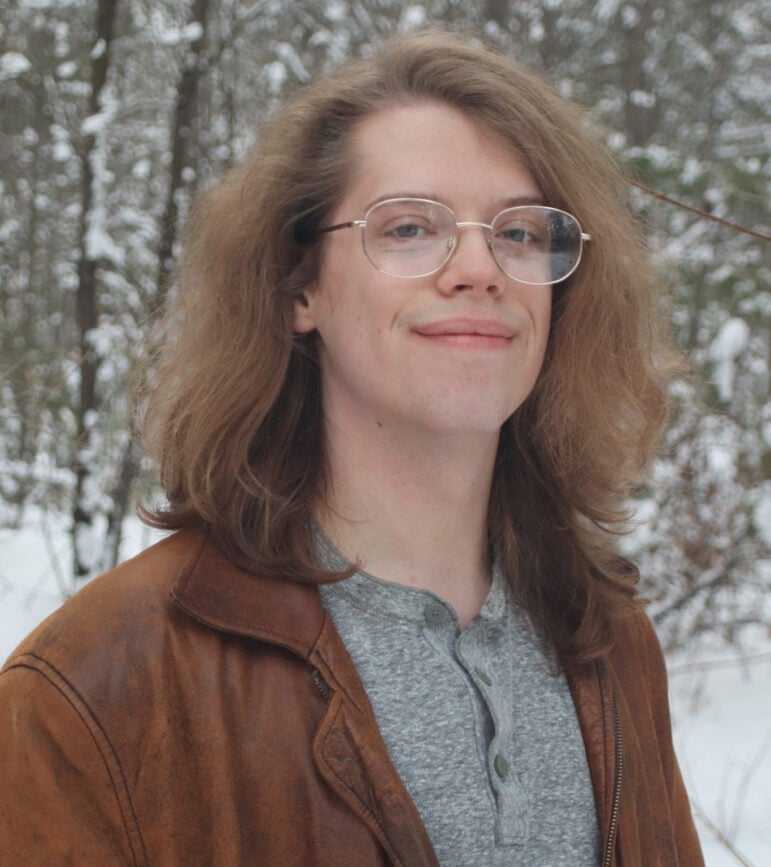
What colleagues say: Jacob is a young innovator working as a game developer and designer to create the next generation of public media. He is known within our team, and increasingly in public media, for fostering a positive and inclusive environment for creation, actively seeking diverse perspectives and championing teamwork to accomplish production goals.
Jacob also stands out with his creative mindset that’s infused with an optimistic outlook. For Jacob, it’s about how can we accomplish something, not what stands in our way. Some of this stems from his unwavering dedication to learning new skills and embracing emerging technologies. Through his productions, he is laying the groundwork for game engines like Unreal and Unity to take their place as tools for the creation of media in the public interest.
Additionally, his current work-in-development is driven by a deep commitment to cultural representation and storytelling, offering players a modern take on his culture as a Menominee Indian Tribe member via a narrative video game.
What Jacob says
Proudest moment: Getting approval to develop a video game about my tribe. I successfully pitched Menominee Homecoming, a video game that teaches the culture and traditions of the Menominee Indian Tribe of Wisconsin. My goal is to create a cultural resource for teachers and students to learn more about Indigenous peoples. What makes me proudest is that Menominee students will see themselves in a medium where they are not represented.
How his values align with a career in public media: Public media promotes education, diversity and equity, which are values I was raised to believe in. My family grew up watching PBS, so to be building a career in public media is an extension of my family’s values.
Inspired by: My experiences as an indigenous storyteller. In my culture, storytelling is used to teach us lessons and remind us of who we are as tribal people. Recognizing that storytelling is inherent to all cultures, that inspires me to search out those stories and to share them to a wider audience.
Advice for other young professionals in public media: Always be true to yourself, and don’t be afraid to share your stories. As my family says, “Everyone is different, and different is good.”
Brisa Siegel
Host, Classical California
KUSC, Los Angeles and KDFC, San Francisco
In three words: “Charismatic, empathetic, conscientious”
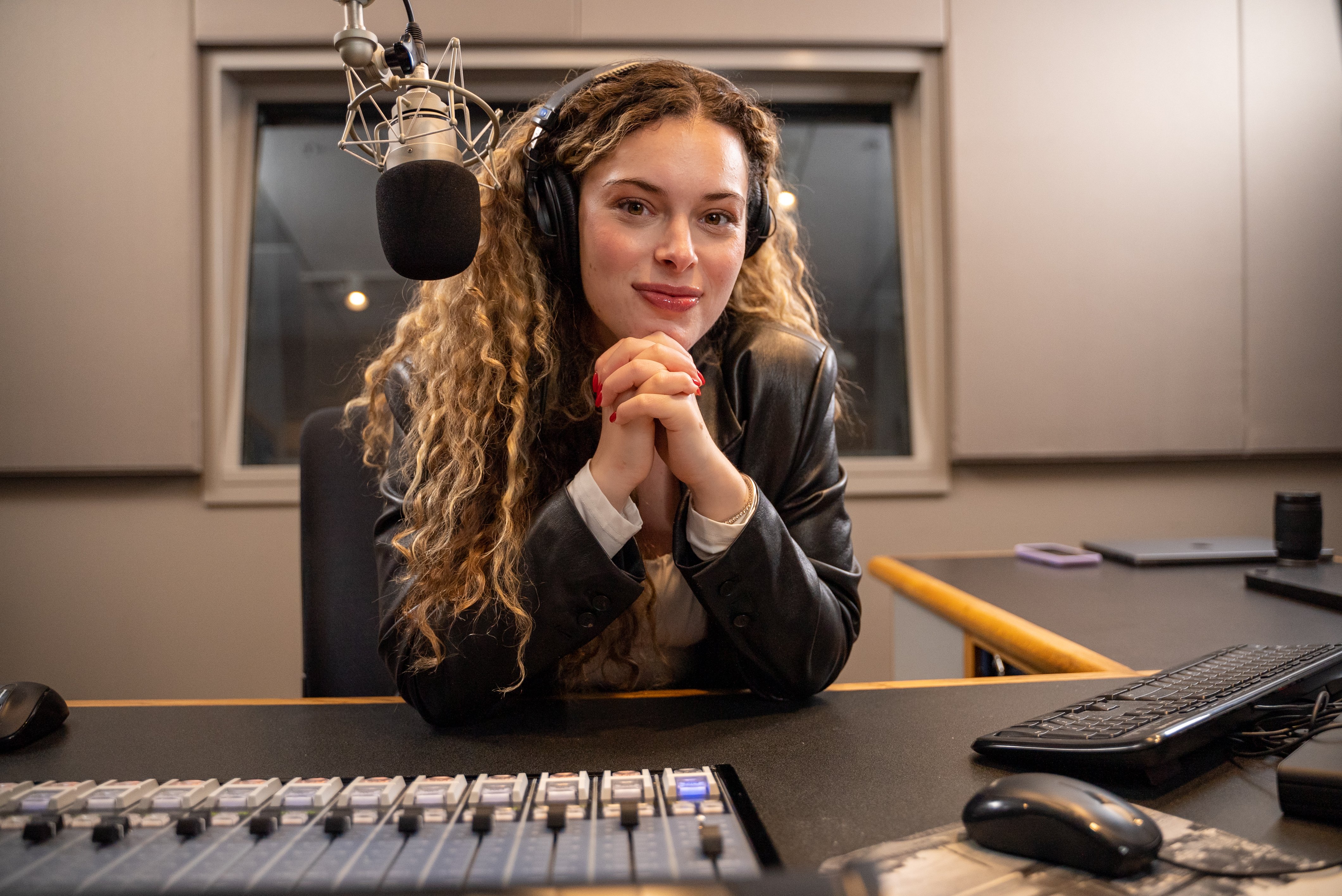
What colleagues say: Brisa joined Classical California’s first-ever cohort of host trainees almost two years ago after working in the entertainment industry. Her curiosity about music, her knack for engaging her audience and her ability to take, understand and apply notes have boosted to her to great success. In her short time on-air, she’s already become a listener favorite.
She is a major force behind the creation of our Nuestra Música streams. Brisa scoured every music library she could find for months to source classical music from across Latin America and the Spanish-speaking world. She also recorded all the voice tracks twice, once in English and once in Spanish, so we could offer a bilingual streaming experience. Far from just providing a simple Spanish translation of English-language content, Brisa worked carefully to observe important nuances within the languages and provided the best possible context for her audiences.
What Brisa says
Proudest moment: The launch of Nuestra Música (“Our Music”), a free on-demand stream of classical music that features music, conductors and composers with influence from Latin America and the Spanish-speaking world. It was created at USC Radio Group by Program Director Kelsey McConnell and produced by Carolina Correa. I host and write scripts in both Spanish and English. Nuestra Música embodies the essence of Classical California’s mission — “To nurture a love of classical music for all.”
How her values align with a career in public media: Growing up in a bicultural family, I’ve learned the importance of bridging worlds and embracing our differences. Working in public media allows me to continue this journey on a larger scale, fostering connection and understanding. Through thought-provoking content, public media becomes a powerful platform for promoting depth and inclusivity, creating spaces where different perspectives are valued. Whether it’s at my family dinner table or behind a microphone, I feel a sense of belonging in spaces that prioritize dialogue and empathy.
Inspired by: As I’ve advanced in my career I’ve found inspiration in my family, my mentors and my colleagues. Their instruction and guidance have led me to an accolade like this! Those who are on my team — their willingness to challenge me, their ability to step outside of themselves, their sense of responsibility, and the integrity and character that they carry in their own lives —are my wells for inspiration.
Advice for other young professionals in public media: Surround yourself with good people with high standards because they’re contagious. Always leave people and places better than you found them. And always call home to check in.
Bianca Taylor
Host/producer
KQED in San Francisco
In three words: “Thoughtful, collaborative, joyful”
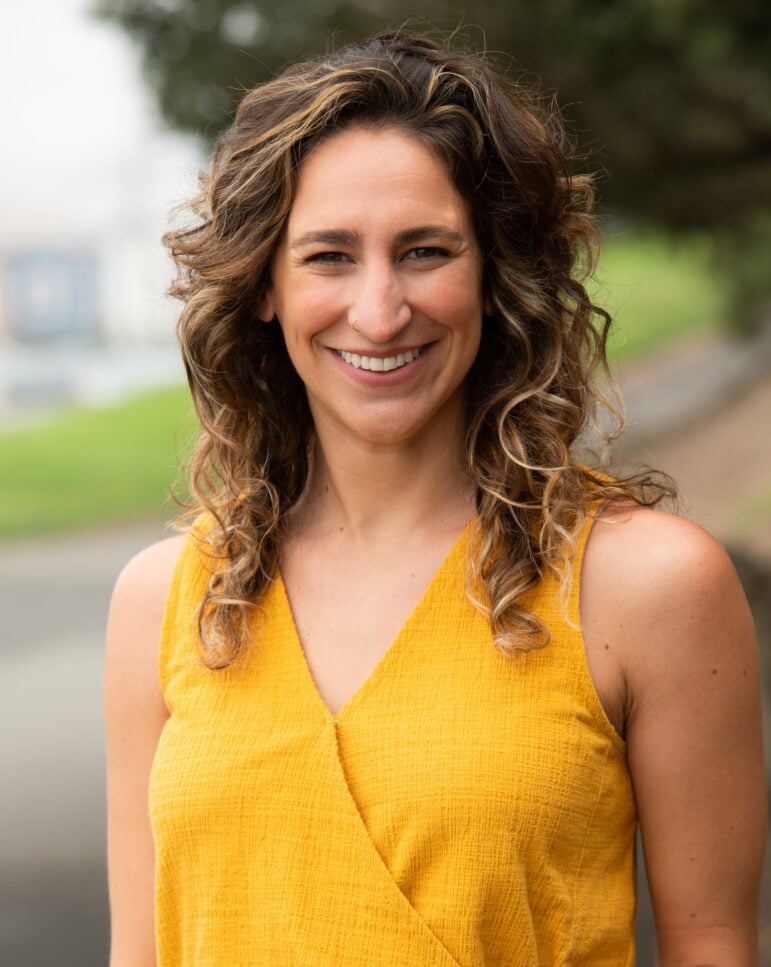
What colleagues say: Bianca strives to stretch herself and public media into new spaces. She has been one of the forces behind some of KQED’s new efforts, including interactive audio. She also brings a sense of joy and delight to her work, producing stories that highlight the best parts of our evolving culture here in California. And she is always eager to understand and lift up the voices and interests of colleagues.
What Bianca says
Proudest moment: Producing KQED’s first-ever interactive journalism feature, the VoiceBot Chronicles, was unlike anything I had ever worked on before. For that reason, it was quite challenging. The team I worked with was brilliantly creative. Our final product ended up winning awards and inspired other interactive projects at KQED, including our first-ever voice-interaction voter guide. I am also proud to witness and be a small part of my colleagues’ efforts to increase equity and representation at KQED.
How her values align with a career in public media: Before I worked in journalism, I got a degree in conflict resolution. I’ve long been convinced of communication’s role in creating a more just and peaceful world. Public media — free, fact-based and transparent information available to anyone, anywhere, at any time — is at the core of that. I feel incredibly lucky to have found a profession that supports my personal beliefs so strongly.
Inspired by: My colleagues are without a doubt the biggest inspiration in my career, especially the women at KQED. Their leadership and expertise — in the public media sphere and in our own newsroom — have shown me how to develop and strengthen my voice, push myself and also find balance.
Advice for other young professionals in public media: Talk to a lot of different people and learn how to do lots of different jobs! At this point I think I have worked almost every single role in our newsroom. Knowing how all the pieces fit together makes me a more effective and empathetic co-worker. Also, find resources early on to help you avoid burnout — don’t wait until wildfire season! Working in public media, and in the news, can be extremely difficult in times of duress. It’s of value to you and to your organization to take care of yourself.
Joy Yoo
Lead product manager, audience activation and engagement
NPR, Washington, D.C.
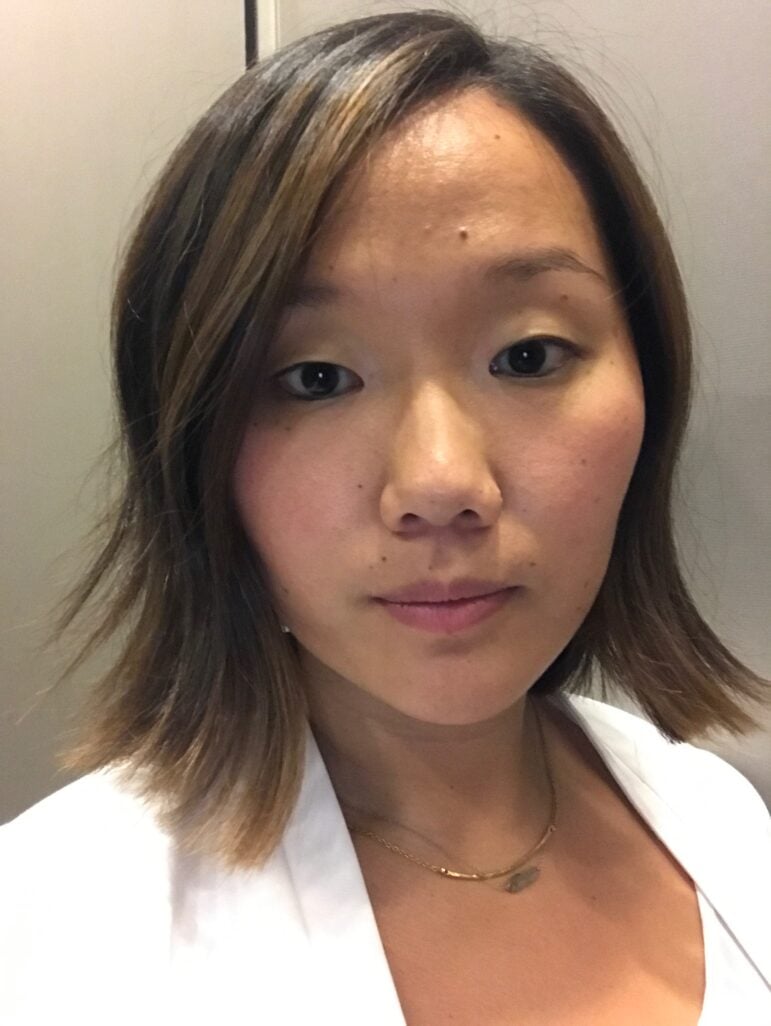
In three words: “Bold, savvy, collaborative”
What colleagues say: Joy is an exceptional leader with unique skills that make her stand out in the public media industry. Her positive attitude and work ethic were shaped by her experience contributing to her family’s small business. She has cultivated a holistic strategic view of the organization, balancing stability with the need for change.
Joy is always ready to listen, learn and adapt. In an industry all too often driven by compromise and consensus, she remains bold. She finds ways to center the audience in all her work, ensuring that her corner of public media resonates with users before anything else.
As the NPR social media product lead, Joy recently played a crucial role in helping communicate to the many groups involved in audience strategy when NPR decided to leave Twitter. Joy helped gather the right teams and stakeholders to ensure we had a solid plan and with messaging that explained why we were leaving and where the audience could find us now that we weren’t on the platform. We were able to make a statement while driving traffic to our newsletters and the NPR app. Both downloads and sign-ups grew during our transition.
What Joy says
Proudest moment: Launching the Up First newsletter really stands out. I collaborated with many divisions on that. It was really a team effort. The newsletter signifies a maturation in NPR’s newsletter portfolio that ultimately delivers great value to our readers.
How her values align with public media: Public media offers the unique opportunity to be in the fast-paced industry of journalism/media while grounding the work in a greater public mission. I believe that public media has an invaluable brand to its audiences because we have ultimate authenticity. For decades, we have been focused on delivering content and experiences that we believe serve the whole individual. As we look at how we need to evolve to serve the audiences of today and tomorrow, that is something that I hope we continue to stick to.
Inspired by: My parents and the many entrepreneurs in my life. My parents are immigrants who have run a small business for nearly 50 years. It has become a pillar in their community. They continue to pour their energies into their business to this day. I admire that. It’s something I aspire to emulate in my career.
Advice for other young professionals in public media: Hard work and ultimate accountability are extremely valuable at any place amongst any team. As much as our workplaces have responsibilities to try and create optimal work environments, I also like to focus on how I can help contribute and shape a culture with my attitude, my outlook and my ability to show up and work hard/smart. Also, I see failures as extremely valuable learning lessons, and believe that showing accountability for errors or what may have fallen short is really important. It helps set the precedent amongst your peers and colleagues that leads to a healthy, successful culture.
Deema Zein
Producer, digital videos
PBS NewsHour, Arlington, Va.
In three words: “Creative, ambitious, enthusiastic”
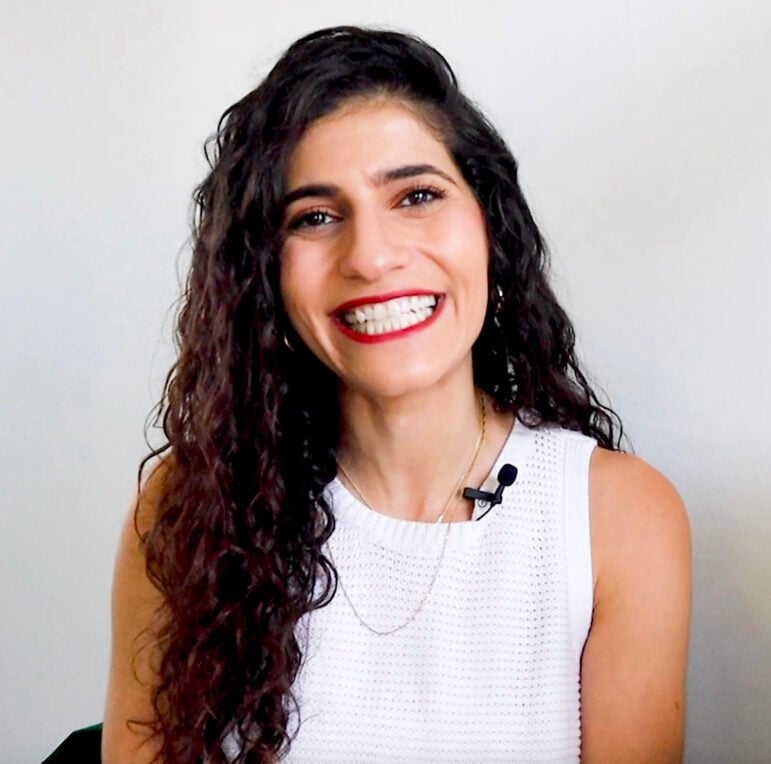
What colleagues say: Deema spearheaded digital series for PBS NewsHour, including “5 Stories,” and launched NewsHour’s official TikTok, where she’s helped grow a viewership of over 100,000 followers in less than a year. Every series or platform that she’s launched has been aimed at reporting news for in a digital-first way, often exploring new platforms and utilizing growing technology to reach new and younger audiences. The results are thoughtful, creative and often humorous takes on the news that maintain journalistic excellence. Her efforts helped our TikTok account earn a 2022 Webby nomination!
What Deema says
Proudest moment: Spearheading and launching our TikTok channel. As the main producer and on-air talent for TikTok, the launch enabled me to tackle breaking news and report on overlooked stories in a unique way. I’ve also been able to pitch boundary-breaking ideas that utilize TikTok trends while staying within a NewsHour tradition. I am immensely proud that in less than a year we grew an audience of over 100,000 followers and received a 2022 Webby nomination.
How her values align with public media: An innate curiosity, quest for truth and passion for storytelling motivated me to build a career in public media. PBS NewsHour allows me to apply creativity while committing to ambitious and accurate reporting of pressing issues. Integrity and honesty are values that resonate with me and align naturally with my career. Support for innovation, creativity and perseverance encourages use of new platforms and technologies to build reach spanning several generations of viewers.
Inspired by: The support from colleagues at PBS NewsHour for TikTok. I saw great potential for a highly trusted and impactful news organization to capitalize on the constantly changing social media platform, but I was intimidated by the newsroom’s reputation and did not want to push the boundaries excessively. The excitement shared by so many talented journalists when TikTok launched continues to inspire me to creatively report the news.
Advice for other young professionals in public media: Learn to be present in your environment and absorb everything, all around you, all the time. Stay focused and strong in your values and goals; don’t let anything distract you. Be fearless, creative and push boundaries! And as many of our talented correspondents and anchors have passed down to me, always stay humble and modest in life and career.


